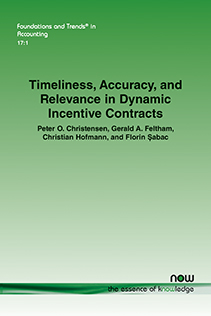Timeliness, Accuracy, and Relevance in Dynamic Incentive Contracts
By Peter O. Christensen, | Gerald A. Feltham, | Christian Hofmann, Ludwig-Maximilians-Universität Munich, Germany, Ch.Hofmann@lmu.de | Florin Sabac, University of Alberta, Canada, fsabac@ualberta.ca
Abstract
We examine managerial performance measures from the perspective of timeliness, accuracy, and relevance in multi-period incentive problems. Although many insights are general, we employ a simple linear framework where managerial actions do not affect risk. We compare and contrast consumption risk for a manager’s preferences with single and multiple consumption dates, respectively. We consider both full commitment to and renegotiation of long-term contracts. Under full commitment, timely and accurate information is usually relevant and desirable; the only differences arise from the modeling of managerial preferences, through the manager’s consumption risk. In particular, the timeliness of performance reports can be irrelevant; then, delaying reports is desirable if it can increase their accuracy.
Under renegotiation of long-term contracts, the timeliness of information release relative to renegotiation is essential. Any information released prior to renegotiation is incorporated into an ex post efficient (renegotiated) contract and is particularly useful in insuring the manager against future consumption risk. Delayed reporting destroys this insurance value and can make late reports irrelevant, independent of the modeling of managerial preferences. But timely reports can create ex ante inefficient action incentives for managers, and then accuracy can be costly as well.
Timeliness, Accuracy, and Relevance in Dynamic Incentive Contracts
Timeliness, Accuracy, and Relevance in Dynamic Incentive Contracts examines managerial performance measures from the perspective of timeliness, accuracy, and relevance in multi-period incentive problems. The authors use a simple linear framework where managerial actions do not affect risk and compare and contrast consumption risk for a manager’s preferences with single and multiple consumption dates, respectively.
Both full commitment to and renegotiation of long-term contracts are considered. Under full commitment, timely and accurate information is usually relevant and desirable; the only differences arise from the modeling of managerial preferences, through the manager’s consumption risk. In particular, the timeliness of performance reports can be irrelevant; then, delaying reports is desirable if it can increase their accuracy. Under renegotiation of long-term contracts, the timeliness of information release relative to renegotiation is essential. Any information released prior to renegotiation is incorporated into an ex post efficient (renegotiated) contract and is particularly useful in insuring the manager against future consumption risk. Delayed reporting destroys this insurance value and can make late reports irrelevant, independent of the modeling of managerial preferences. But timely reports can create ex ante inefficient action incentives for managers, and then accuracy can be costly as well.
